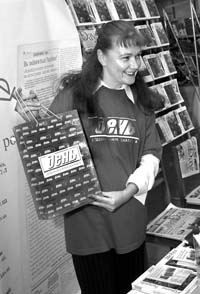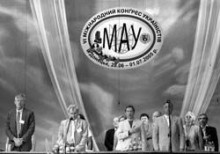The 6th International Congress of Ukrainian Studies was held at the National University of Donetsk under the auspices of the International Association of Ukrainian Studies, the Ukrainian National Academy of Sciences, the Ukrainian Ministry of Education, and the University of Donetsk. According to congress coordinator Natalia Yaroshenko, the decision to hold the congress was approved in May of last year, when Donetsk picked up the baton from Chernivtsi, which hosted the congress in 2002. One year is hardly enough time to organize such a huge forum. As Ukraine’s Deputy Prime Minister Mykola Tomenko declared, the Donetsk Congress of Ukrainian Studies may be called “the first high-level event of this kind to have been prepared on such short notice.” He was primarily referring to the tremendous volume of academic work that was completed by the University of Donetsk and other Ukrainian institutions as part of the preparations for the congress. Owing to the high level of the university and the outstanding reputation of its philological faculty, with its strong school of Ukrainian studies, the Donetsk congress attracted world famous scholars. Moreover, according to Mykola Tomenko, the fact that Donetsk played host to the 6th Congress is proof that “the values of a Ukraine united, a Ukraine in which every region is unique, are being preserved, and representatives from every region should be able to feel at home anywhere in our vast homeland.”
As Donetsk University rector and chairman of the Board of Donetsk Region University Rectors Volodymyr Shevchenko told The Day, this year’s forum of Ukrainists was attended by scholars from 35 countries, bringing together a record number of academics since the congress was founded and in the 16 years since the International Association of Ukrainian Studies was established. Dr. Shevchenko says that the organizers were forced to turn down over half of some 1,300 applicants. As a result, some 700 speakers participated in the forum’s thematic sections.
The congress was dominated by topics from the fields of Ukrainian language and literature, culture, history, and ethnology. Speakers also addressed the current state of philosophy, political science, sociology, and design trends. According to Volodymyr Shevchenko, for the first time in the history of the congress the sections over which he presided addressed several new questions, such as issues and problems of educational reforms and political science, in addition to traditional topics. As The Day learned from Natalia Sydorenko, congress participant and professor at the Journalism Institute of Kyiv National University, a section on journalism was to be held as part of the congress but was cancelled shortly before it was supposed to start, much to her regret.
The program of the congress featured a small book fair and presentation of new publications addressing various problems faced by Ukrainian studies. The Day presented its three-volume library series: Ukrayina Incognita, Dvi Rusi, and Viyny i Myr [Wars and Peace], which proved very popular with the congress participants. Most of the Ukrainists who came to Donetsk flocked to The Day’s newspaper and book stand. As congress participant Olena Shkolna from Kyiv told The Day’s correspondent in confidence, she was so enthralled by The Day’s books that she nearly missed the registration period. Some scholars visited the stand several times, painstakingly examining the publications, which, according to Ola Hnatiuk and Renata Rusak from the Ukrainian Department at the Slavic Studies Institute of the Polish Academy of Sciences in Warsaw, are not only very informative and distinctive, but also boast a very original design, which makes people want to leaf through them. “I, for one, have all three books from The Day’s library series but I still visited your stand. I especially like the book Ukrayina Incognita; no one who reads it can remain indifferent,” says Polish Ukrainist Ola Hnatiuk.
Probably half of all the visitors who examined our library series were from Western Europe and the US. The guests from overseas were especially interested in the third book, Wars and Peace, which is the top-rated book in the nation and was named Book of the Year. Meanwhile, Ukrainian scholars, especially from eastern Ukraine, focused their attention on the book Dvi Rusi and the problem of Russo-Ukrainian relations. According to Liliya Kakoyeva, assistant professor at the Literary Theory Department of the Philological Faculty of Donetsk National University, she and her colleagues have known about this book for a long time, but not everyone had an opportunity to buy it before now. According to Prof. Kakoyeva, this problem is of great interest to the students of the Philological Faculty, especially its Russian Studies division. Students have complained about the lack of presentations and book fairs where they could learn more about The Day’s books or bookstores where they can be purchased in the Donetsk region. “For example, we find the materials by Klara Gudzyk very interesting. I used her article ‘Road of Losses: the Independence of the Ukrainian Church’ to prepare a report that explores a yet unknown, huge stratum of Ukrainian spiritual history. In general, we like many of your newspaper’s regular contributors. It is a godsend for a student pursuing cultural studies,” says Iryna Lohvynova, a fifth-year philology student. We can only hope that these words will reach Deputy Prime Minister for Humanitarian Policy Mykola Tomenko, who is also oversees the retail book trade, a sector that was run into the ground by his predecessors.
The first book in the library series, Ukrayina Incognita, is arguably the most popular one. It turns out that most of those who bought the two remaining books already had the first volume in their home libraries. Anastasiya Vorotynska, candidate of philology and congress participant, has long had the three volumes in her collection, but still likes to reread the first book: “I like the article entitled ‘Roman Traces in Southern Ukraine.’ I come from Ukraine’s south and keep an eye out for anything pertaining to these parts.
And even though I’m sometimes skeptical about historians’ attempts to revisit this subject, The Day’s author adopted such an unusual approach and his style was so subtle that I simply lost myself in the book.” Apart from our books, guests took a keen interest in The Day’s photo album, which sold out like hotcakes. Some visitors spent hours looking at the photos, discussing faces, details, and small fragments of life captured by the photographers. Even Serhiy Vahanov, a well known Donetsk-based photographer and participant of The Day’s photo contest, studied the album for a long time as though making mental notes. The faces of people who were buying the photo album displayed the entire gamut of feelings.
Interestingly enough, virtually all buyers expressed gratitude for The Day’s sincere, able, and patient efforts to preserve the values of our country and its complex history.
Incidentally, when the president of the International Association of Ukrainian Studies, Mark von Hagen, said in his opening speech that today “the Ministry of Culture and Mykola Tomenko are passively watching the collapse of Ukrainian culture,” individual scholars in the audience voiced their agreement, among them the American Ukrainist Alec Berstein. However, after noticing our correspondent’s nametag, he smiled and said touchingly in Ukrainian: “These words do not apply to you. The Day is working wonders.”
COMMENTARY
Professor Yury SHAPOVAL, Ph.D. (History):
“This was the 6th International Congress of the Association of Ukrainian Studies. It was a milestone event, if only because it took place in Donetsk. I think that it was a very big plus that international scholars who are engaged in Ukrainian studies got together, and that numerous stereotypes about the Donetsk region have now been laid to rest. People have seen Donetsk for what it really is, along with its attributes and peculiarities. Many foreigners told me that everything is surprisingly normal here, not the way they had imagined. In particular, the city fathers and oblast authorities approached the task of organizing the congress with the utmost seriousness. Therefore, I would like to reiterate that Donetsk is not only a center of generally known political trends, but also an outstanding academic center. And I think that this is a very impressive positive asset. As for the shortcomings, in my subjective opinion, these kinds of gatherings are not extremely effective. Rather, people gather to establish or strengthen contacts and send certain messages through their presentations, or make statements about some issues to one another. The greatest benefit will come from the collections of materials based on individual topics that were presented at the congress.
There were numerous organizational problems. For example, we received a sizeable congress program complete with last-minute changes that were nearly as large in volume. Rooms were mixed up during the congress, which sent scholars rushing from door to door in search of their subjects of interest. I think we could have avoided this. Among the downsides was the fact that the heads of the International Association of Ukrainian Studies wanted to distance themselves from structures that they consider conservative, for example the Ukrainian National Academy of Sciences. I do not consider this position to be correct. I am dissatisfied, among other things, with the address by Deputy Prime Minister for Humanitarian Policy Mykola Tomenko. To me it was much too abstract and vague. Even worse, Tomenko disappeared from the congress after a rather short time. So the main part of the discussion, including criticism of the government and the deputy prime minister in particular, took place in his absence. The government seems unable to overcome the bureaucratic syndrome whereby guests arrive, deliver speeches, and vanish. This is especially distressing to see this happening during an international gathering. Mykola Tomenko has not yet earned the right to treat an international community of scholars this way. It is a lesson for both him and all of us, because we are beginning to understand more and more what the new government is really all about.”








